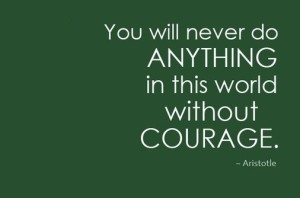Do You Have What it Takes to Make Tough Calls?
Most of us have far more courage than we ever dreamed we possessed. – Dale Carnegie
One of the hardest things I’ve done at work was firing a customer. Oh, man, it took courage. We’d had a good relationship for many years, but then the company hired a new leader to manage the work with us. This new leader showed little interest in our input, lacked professionalism and didn’t seem to care about having a trusting relationship.
So I walked away from the work.
Two people fueled my courage to do it. The first, a colleague, said to me, “Matt, you get along well with others. Sometimes, though, you have to take a stand and speak the truth, even at the risk of ending the relationship. I think you need to walk into the CEO’s office and tell him what you think. Do this for your own integrity.”
The second, a mentor, told me, “Matt, if you aspire to work with senior leaders in your career, you need to prove to yourself that you can have a tough conversation with them.”

Initially, I resisted their advice. My personality style and insecurities whispered to me that this was outside of my comfort zone. But I knew that they were right. And I knew that I had to do the right thing, even if it was hard and costly.
The cost paid off, though, in more ways than one. The courage to take that big action fueled courage to do other, smaller things. And it’s given me the energy (and ultimately, the time) to focus on more productive relationships.
Last week, I wrote about the importance of vulnerability-based trust in relationships. This type of trust includes collaborating with others to have honest, transparent, often difficult communication. To have this type of relationship—to do anything important in life, for that matter—you have to have courage, to be able to show strength in the face of pain, grief or fear.
To care, lead, risk, forgive, show up, let go, try and engage, you first have to have courage. The good news is, you don’t have to go it alone.
Surround Yourself with Encouragers
Speaker, author and counselor Jim Jackson once told me that one of the greatest gifts you can give to others is to help them develop their courage. Helping someone find their inner courage is to be an “en-courager.”
Here’s what encouragement looks like:
- Hearing another person’s fear, pain or grief
- Seeing someone not just for who they are but for who they could be
- Asking questions that lead to deeper insights about what is and what’s possible
- Speaking truth about what you see and hear
- Resisting the temptation to judge, shame or fix the other person
- Allowing the other person to act on their own will
- Affirming the courage that you see demonstrated in the other person
- Remaining sensitive and supportive of the pace that others develop courage
I was fortunate to have encouragers who helped me make a tough call with a client. Who are your encouragers? Who are you encouraging?
Like Dale Carnegie said, we likely already possess far more courage than we realize; we just need that little encouragement to bring it to the surface so we can take the necessary steps forward.









Comments are closed here.